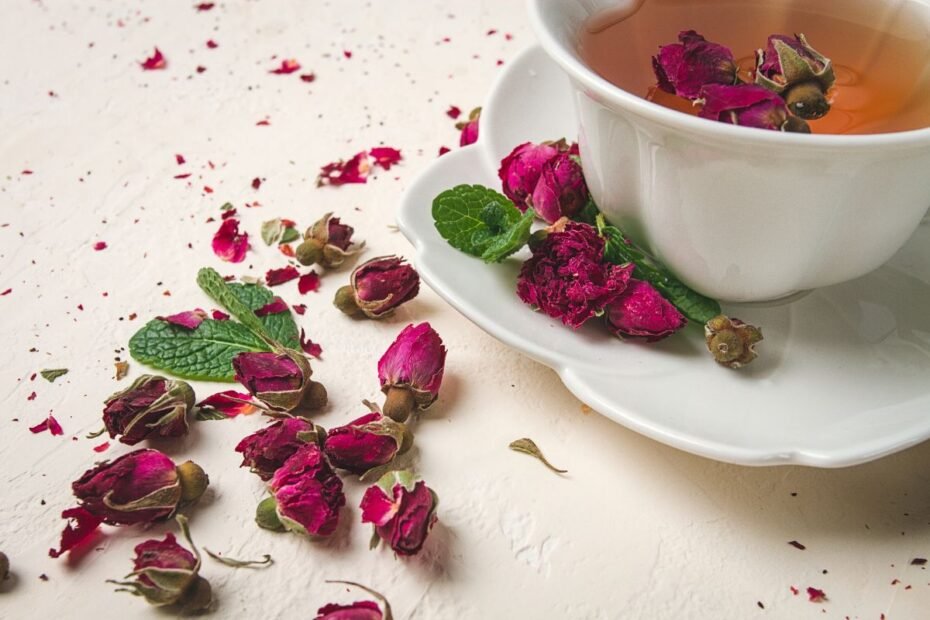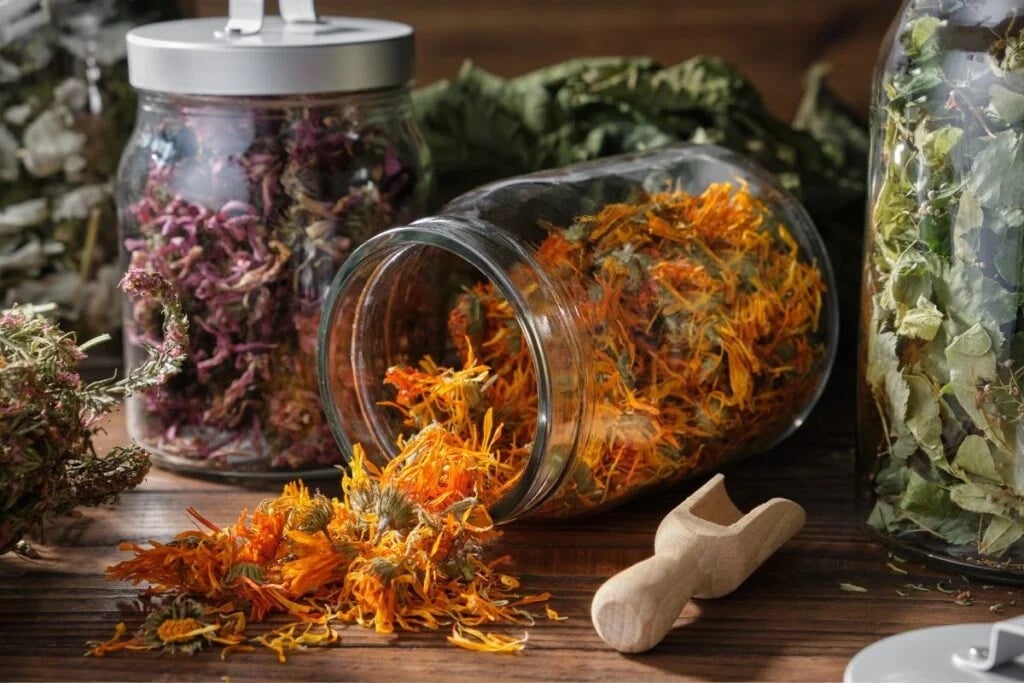Have you ever tasted rose tea? Maybe this is the sign to finally try it if you have not yet. Because it is tasty and advantageous for your health. Rose tea is a fragrant beverage rich in flavor and history, closely linked to different cultures and medical practices.
A Brief History of Rose Tea
Rose tea was introduced around 5,000 years ago in ancient China, and its tradition spread to other countries via Arabia and Persia. The Arabs, known as plant experts, developed the use of roses in beverages and started to produce rose tea as we know it today. In medieval, rose tea symbolized luxury and was served as a beverage in high-society meetings. Impressive, right? It wasn’t until the 19th century that rose tea became a drink anyone could enjoy.
This tea will delight your palate and be beneficial for your health. Yes, that’s right! In ancient folk medicine, rose tea was used as a natural way to fight various diseases and improve wellness. It was also renowned for its calming properties, which help to reduce stress and facilitate sleep. Today, rose tea is loved all over the world for its exceptional properties. And its many variations allow everyone to find a taste that suits them.
What Does Rose Tea Taste Like?
The taste of rose tea depends on the type of petals or buds used, with some varieties being sweet and others being more bitter. The taste of rose petals and buds is almost the same as the smell of roses. So if you like it fresh, you will probably like the taste of the tea. Genuine rose tea has a delicate floral flavor with a slight sweetness. Although the flavor is not very strong, but rose aroma is wonderful.
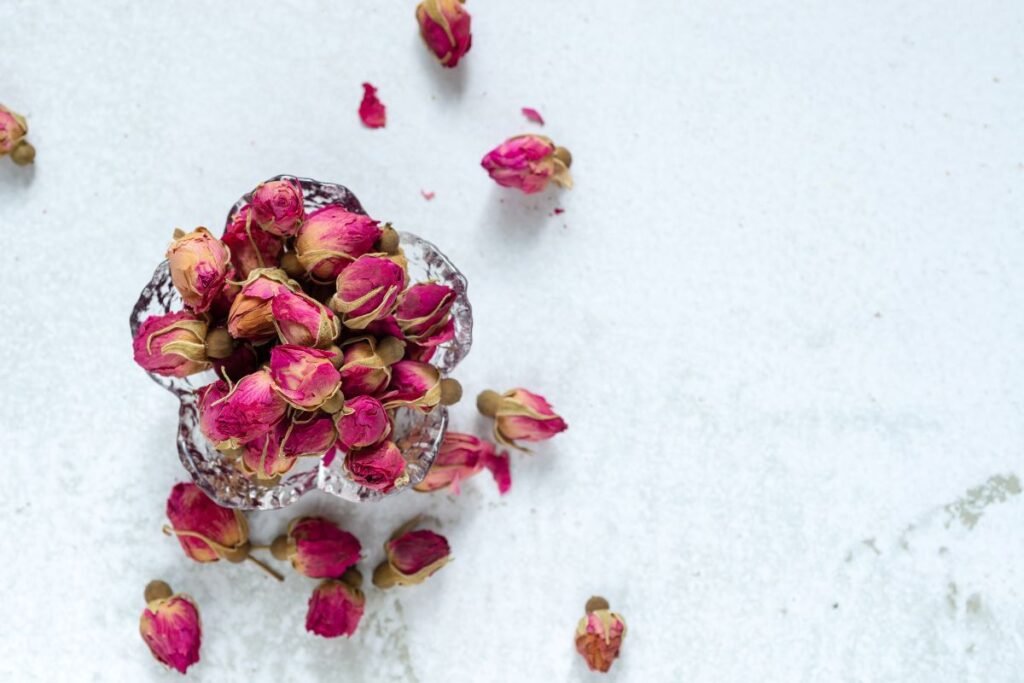
Are the Petals and Buds of All Roses Edible?
Yes, all rose species are suitable for tea. Wild roses, flowers from your nursery, or those bought at the market are perfect for this. The choice is yours. When making wild rose tea, remember to use an organic one that is not treated with chemicals.
Although all varieties of roses are edible, not all have a pleasant aroma for tea. The scented petals of roses contain the much-appreciated essential oils, whose extractions are used to produce perfumes and other beauty products. A cup of rose tea reveals their fragrance. However, the best varieties for making tea are Rosa damascena, Rosa centifolia, and Rosa gallica. It is essential to choose a scent that is right for you. Although the color is relatively unimportant.
What Are the Health Benefits of Rose Tea?
Rose tea smells and tastes delicious and also has health benefits. It contains anthocyanins, gallic acid, kaempferol, and quercetin. Traditionally, this tea has been used to improve digestion, protect the heart, and relieve inflammation and various kinds of pain. And that’s not all! Rose tea and rose extracts may have antimutagenic, anti-inflammatory, antimicrobial, antidiabetic, antioxidant, and antidepressant effects. However, many of the potential health benefits are still not scientifically substantiated.
1. Source of Antioxidants
Rose tea is rich in antioxidants. One study has shown that rose tea may have a higher free radical scavenging activity than green tea. However, not all green and rose teas are the same. Depending on the type and other factors, they may have more or less antioxidant activity. It is believed, that adding a few rose petals to black or green tea can increase the antioxidant activity even further. Another study showed that tea made from rose petals can have a much higher antioxidant activity than tea from rose buds.
2. Improves Sleep
Pure rose tea contains no caffeine, meaning you can enjoy it even just before bedtime. In addition, studies have shown that some of the compounds in rose extracts have hypnotic effects. It can be beneficial for falling asleep faster.
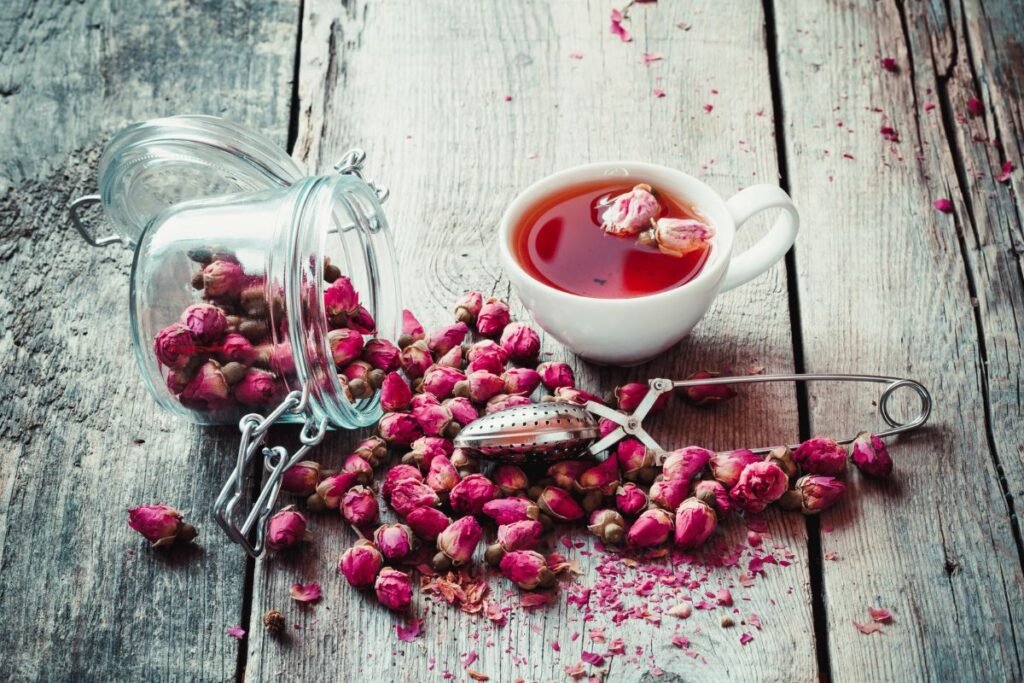
3. Pain Relief
Rose extracts can help relieve pain as they have an analgesic effect. Studies have shown that rose extract can potentially prevent seizures and help people with Alzheimer’s disease.
4. May Help with Menstrual Cycle Disorders
One of the traditional uses of roses is the treatment of menstrual cycle disorders. Studies have shown that tea made from roses can actually help a lot in treating these symptoms, including menstrual pain and reduction in anxiety.
5. Improves Digestion and Helps with Weight Loss
Rose petals can help digestion and have a mild laxative effect. Pure herbal rose tea is calorie-free, which makes it ideal for people controlling their body weight.
Rose Tea Recipes: Before Brewing
When you choose a rose tea recipe you like, make sure that the rose bushes you choose have never been sprayed with pesticides and do not grow close to the road before you start. It is best to pick rose petals that have just opened. You can also use dried petals if you have them, of course.
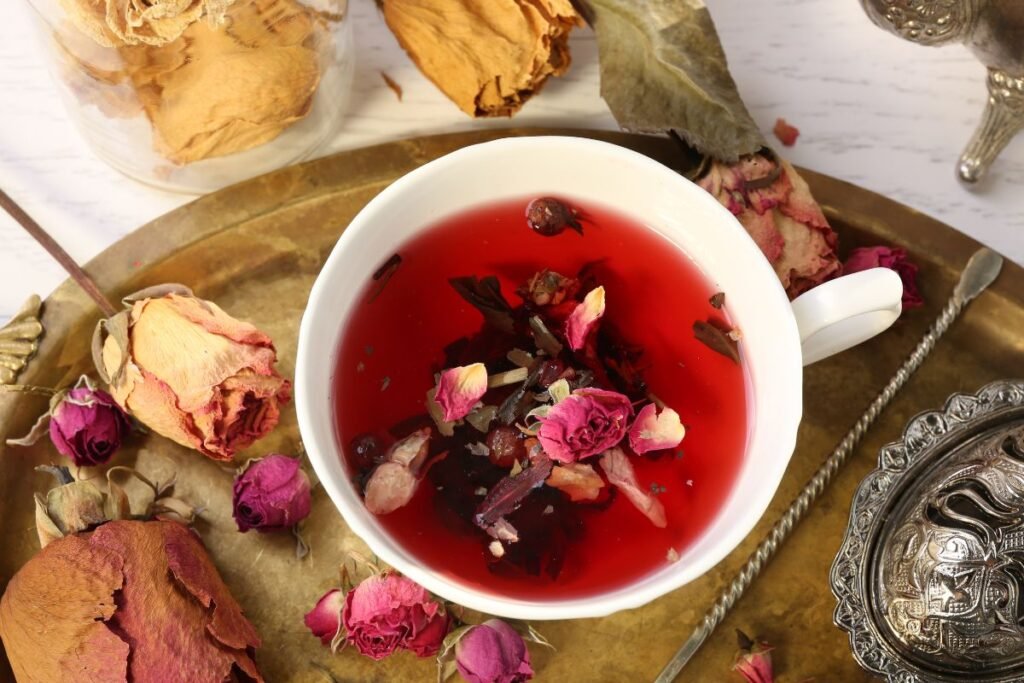
Classic Fresh Rose Petal Tea
Ingredients:
- 1 or 2 cups of fresh rose petals
- 3 cups of water
- sweetener to taste (sugar, honey, etc.)
Rinse the rose petals in cold water. Fill the saucepan with three cups of water and let it come to a boil. Add the rose petals and boil for 3–4 minutes. Pour the tea into the cups. Enjoy!
Vanilla Rose Tea
Ingredients:
- two tablespoons of dried rose petals
- 2 vanilla pods, cut and peeled
- 2 cups of water
- Sweetener to taste (sugar, honey, etc.)
Prepare this tea in the same way as the classic tea. Put the ingredients in a large teapot with boiling water. Boil for at least 3–4 minutes. If you wish, add your preferred sweetener.
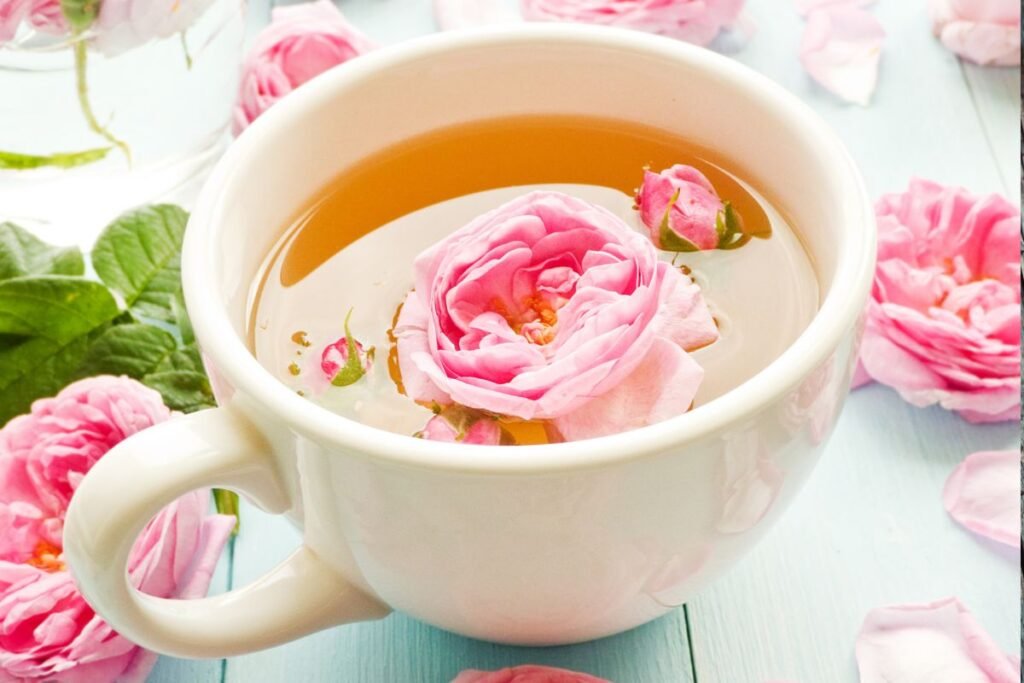
Lemon Rose Petal Tea
Ingredients:
- 4 cups of water
- 1 teaspoon rose extract
- 1 tablespoon of red rose petals
- Sweetener to taste (sugar, honey, etc.)
- Juice of one lemon
Mix all the ingredients in a teapot and pour boiling water over it to make this red petal tea. Leave to simmer for 5 minutes and enjoy.
Rose and Black Tea Blend
Roses combine well with many ingredients. You can add a few of its petals to your favorite tea to create a special blend of flavors. The rose and black tea blend is one of the most popular rose tea options. To make this tea, you will need dried rose petals and black tea.
Ingredients:
- 1 teaspoon of black tee
- 1 cup of water
- ½ teaspoon dried rose petals
- Honey (optional)
Boil the water and let it cool for about a minute. Put the black tea leaves and rose petals in a teapot. Pour the water over the tea leaves. Leave for 3-5 minutes. Strain and enjoy.
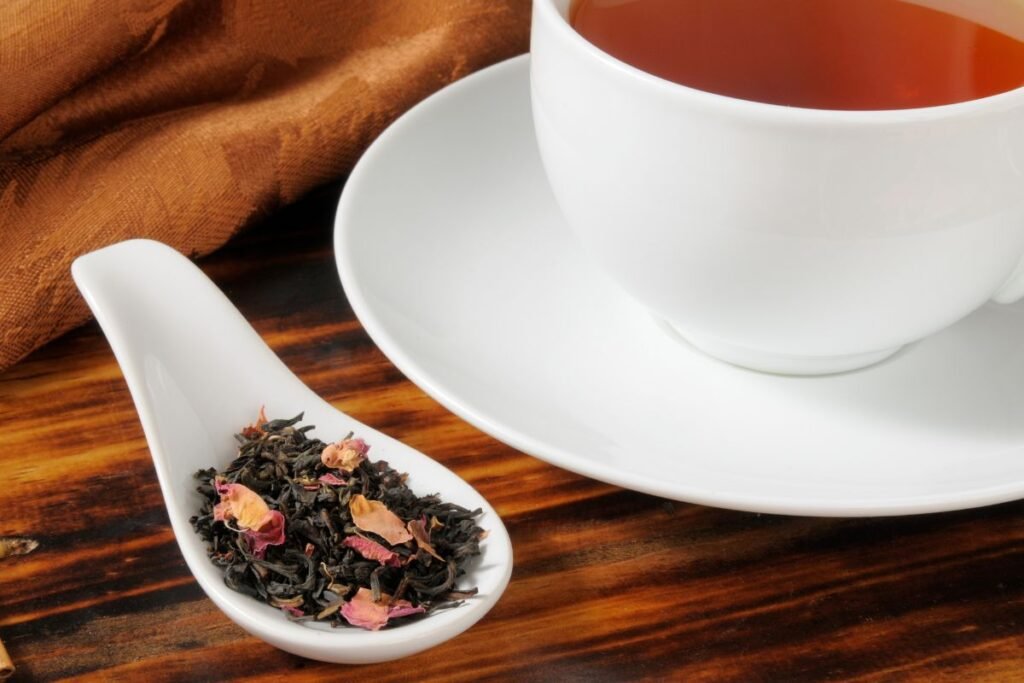
Can I Drink Rose Tea Every Day?
If you make rose tea using only rose petals or rose buds, you will make an herbal infusion and take it daily. Herbal infusions do not contain caffeine. It means they are harmless even with frequent use. On the other hand, if you make mixtures with green or black tea and rose petals, there are some restrictions on their use.
Does Rose Tea Have Side Effects?
Although it is generally safe to drink rose tea, some side effects, such as allergies, are possible. Always check with your doctor before adding new flowers, herbs, and plants to your diet. Especially, if you already have a medical condition.
Sources:
https://simplelooseleaf.com/blog/herbal-tea/rose-tea/
https://rosaholics.com/blogs/rosaholics-bloggers/how-to-make-tea-with-rose-petals
https://www.halmaritea.com/blog/steps-make-rose-tea-properly-benefits/
https://www.onoteas.com/rose-tea-a-true-healing-concoction/
https://www.researchgate.net/publication/227635524_Rose_Petal_Tea
https://www.researchgate.net/publication/331311805_Effects_of_dried_Rose_Petals_Rosa
https://dergipark.org.tr/tr/download/article-file/398377
https://www.ncbi.nlm.nih.gov/pmc/articles/PMC3586833/
https://pubmed.ncbi.nlm.nih.gov/16154059/
https://www.ncbi.nlm.nih.gov/pmc/articles/PMC3757593/
Associative photos from © Canva.
